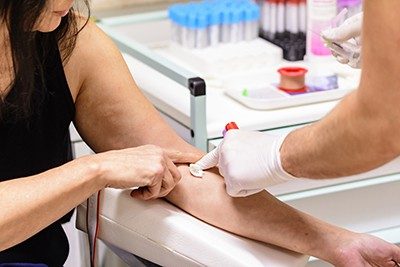FOR IMMEDIATE RELEASE
ACS News Service Weekly PressPac: July 21, 2021
New method predicts COVID-19 severity, could help with hospital triage
“Rapid Classification of COVID-19 Severity by ATR-FTIR Spectroscopy of Plasma Samples”
Analytical Chemistry
During the height of the pandemic, some hospitals were overwhelmed with patients seeking treatment for COVID-19. This situation could happen again during future outbreaks, especially with SARS-CoV-2 variants of concern on the rise. Now, researchers reporting in ACS’ Analytical Chemistry have developed a blood test to predict which people infected with COVID-19 are most likely to experience serious symptoms, which could help health care workers prioritize patients for hospitalization and intensive care.
Although many people who contract COVID-19 have either no symptoms or mild ones, some require intensive care for pneumonia with acute respiratory distress syndrome. Risk factors for severe disease include older age, heart disease, cancer and diabetes, but these characteristics alone are not sufficient to predict which patients will become the sickest. Measuring levels of certain proteins or metabolites in the blood could help, but these tests are often slow, complicated or expensive. For more effective triage of COVID-19 patients at hospitals, Michelle Hill, Sanjeeva Srivastava and colleagues aimed to develop an easy-to-use method that could quickly and cost-effectively predict COVID-19 severity.
To measure changes in blood biochemistry that occur with severe COVID-19, the researchers chose a technique called attenuated total reflectance Fourier transform infrared spectroscopy (ATR-FTIR), which has been tested previously as a COVID-19 diagnostic tool. Two regions of FTIR spectra from 128 patient plasma samples showed small but observable differences between those with severe and non-severe COVID-19. Using these data together with clinical information about patients, the researchers developed a statistical model to predict COVID-19 severity. They found that the best predictor was whether the patient had diabetes, followed by the two regions in the FTIR spectra. Adding the FTIR data to the model improved the sensitivity for detecting severe disease in a different set of 30 patients from 41.2% to 94.1%, but reduced the specificity from 84.6% to 69.2%, compared with the clinical factors alone. This means that the new test was more likely to identify severe cases, but it also had a higher rate of false positives, than the clinical data alone. Although the strategy needs to be tested in larger numbers of patients, it shows promise as a rapid, simple and economic triaging test for hospitals, the researchers say.
The authors acknowledge funding from the Science and Engineering Research Board of the Government of India, the Industrial Research and Consultancy Centre of the Indian Institute of Technology Bombay, the Council of Scientific and Industrial Research, India, the Australian Government Research Training Program and the QIMR Berghofer Medical Research Institute, as well as instrument support from Agilent Technologies.
###
The American Chemical Society (ACS) is a nonprofit organization chartered by the U.S. Congress. ACS’ mission is to advance the broader chemistry enterprise and its practitioners for the benefit of Earth and all its people. The Society is a global leader in promoting excellence in science education and providing access to chemistry-related information and research through its multiple research solutions, peer-reviewed journals, scientific conferences, eBooks and weekly news periodical Chemical & Engineering News. ACS journals are among the most cited, most trusted and most read within the scientific literature; however, ACS itself does not conduct chemical research. As a leader in scientific information solutions, its CAS division partners with global innovators to accelerate breakthroughs by curating, connecting and analyzing the world’s scientific knowledge. ACS’ main offices are in Washington, D.C., and Columbus, Ohio.
To automatically receive press releases from the American Chemical Society, contact newsroom@acs.org.
Note: ACS does not conduct research, but publishes and publicizes peer-reviewed scientific studies.
Media Contact
ACS Newsroom
newsroom@acs.org


